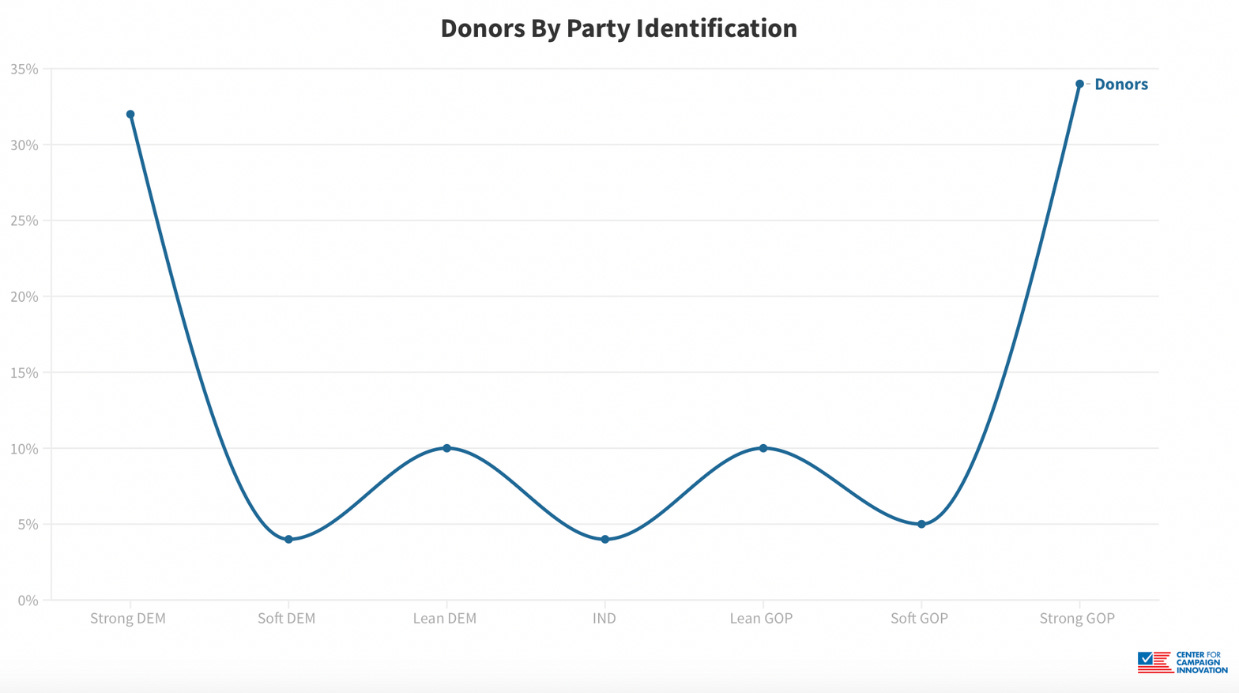It's true, campaign fundraising is out of control. Here's how to fix it.
Digital fundraising has grown too broad, and supporters find tactics "annoying" and "rude"
Friend, it isn’t looking good.
As political fundraising has moved online, campaigns’ donation efforts have exploded, flooding voters’ inboxes with warnings that the future of our country is in SERIOUS jeopardy because the other party has raised HUGE amounts of money.
Will supporters donate as part of an EXTENDED 2500% IMPACT and go down in history as a Patriot that helped bring their party to VICTORY? Or will they ignore it and miss the End-of-Quarter deadline?
A report from the Center for Campaign Innovation found many people are choosing the latter.
The report was made from a national survey of voters that oversampled donors, and it found digital fundraising efforts have gotten too broad, campaigns are reaching voters unlikely to donate, and their messaging is turning many people off.
“When we started out with online fundraising a decade and a half ago, we always emphasized to the candidates and campaign managers that this was going to the most loyal part of your base,” said Eric Wilson, a Republican digital strategist who directs the center. “What we’re seeing now is that campaigns and other fundraisers have just completely taken the guardrails off of that.”
Typical donors are older and more civically engaged, the report found. Independents and those who lean Democratic and Republican are less likely to give than those who identify as strong Democrats or Republicans, but emails are reaching moderate and swing voters and even donors from the other party (How do donors get emails from the other party, you might ask? They might have voted one year in the other party’s primary or signed up for updates from their local congressperson of another party, Wilson said.).
“It’s just completely gone from this targeted focused effort for supporters to a dragnet that bombards voters writ large, regardless of whether they’re likely to donate or not.”
In focus groups conducted for the study, volunteers and donors estimated about nine in ten emails and texts they receive from candidates and campaigns were donation requests, and respondents said the volume was “annoying” and the tone was “rude.”
“I get turned off from all the money requests I receive, without stating why I should be sending money except to match the Democrat donations,” one respondent said. “I'd like to receive more information about policies and issues that are important to me.”
A survey of more than 300,000 emails sent during the 2020 campaign cycle by researchers at Princeton found manipulative fundraising emails are the norm.
The median active sender uses at least one manipulative tactic in about 42% of their emails, they found, such as subject lines starting in “re:” to make emails appear to be replies when they’re not (e.g. “Subject: re: Lindsey Graham”) and misleading claims of donation matching. Other emails give a false sense of urgency, like including a number ostensibly indicating donations that starts ticking down after an email is opened (see below).

Wilson said campaigns have “been treating digital audiences as an ATM.” Commonplace tactics have worn out their welcome, and in many cases, email fundraising has become indistinguishable from one candidate to the next.
“If you take the identifying information off of a campaign fundraising email, you could easily replace it with the name and disclaimer of another candidate,” he said. “There’s nothing unique to it anymore.”
Not every candidate is going with a cookie-cutter approach, though. Sen. Todd Young’s (R-Ind.) “Hoosier Horn” email sent days before last year’s election included a video from a D-Day veteran supporter, photos from campaign events, and links to articles from right-leaning news outlets before asking for donations.
Sen. John Fetterman’s (D-Pa.) campaign offered “exclusive photos from the Obama rally” in an email after the former president visited Pennsylvania, and another email asked supporters to donate for the chance to be featured on the campaign’s “Grassroots Donor Wall.”
What donors want, according to the Center for Campaign Innovation’s study, is things like updates about policies and issues, what the candidate is doing, and how donors’ money is making an impact. In other words, content-focused emails with communication beyond just fundraising. The report suggests campaigns reduce their fundraising footprint and better segment and target supporters.
“Email is actually a really important voter contact tool,” Wilson said.
Have you seen this?
First lady Jill Biden’s Inauguration dresses are now at the Smithsonian. Biden presented her Inauguration ensembles at the National Museum of American History Wednesday for its “The First Ladies” exhibition. The clothing includes the ocean blue dress and coat designed by Alexandra O’Neill worn during the swearing in, the ivory dress and coat with embroidered flowers from every state and territory designed by Gabriela Hearst worn in the evening, plus matching face masks for both. Said Biden, “Clothing is an art and articulation. It’s a manifestation of a moment of time. It’s history.”
Former President Donald Trump will be allowed back on Facebook. Parent company Meta said Trump’s accounts will be reinstated "in the coming weeks” after being suspended following the Jan. 6 attack on the U.S. Capitol. If he violates the company’s terms of service again he could be re-suspended, Meta president of global affairs Nick Clegg wrote in a blog post. [CBS News]
Monotype weighs in on U.S. State Department’s switch from Times New Roman to Calibri. “I like seeing the highest levels of the U.S. government trumpeting the importance of typography,” Monotype creative type director Charles Nix said, but “the number one factor, hands down, affecting legibility is the size of the type.” The State Department recommended 14-pt type would be accessible in either typeface, he said. [It’s Nice That]
How politicians build partisan brands off their states. Politicians are leaning on their state’s red or blue bona fides to prove their own partisan credentials, and as states become more polarized, it isn’t hard to do. [𝘠𝘌𝘓𝘓𝘖]








